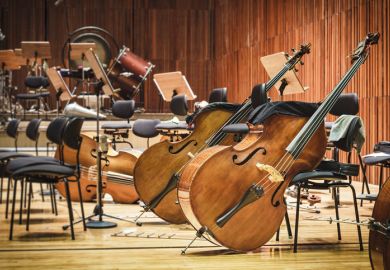Nobody,'' the author announces, "has spent a whole book on operatic productions before.'' This, with "productions'' in the plural, seems accurate. Tom Sutcliffe is a critic with a mission. First in The Guardian, later in the London Evening Standard, now in this book, he has set out to defend the notion of the producer as the true interpreter of opera in the theatre and to appraise the work of those modern producers he thinks most exciting. "Staging is the test"; "interpretation has become the central critical issue'' and the right interpretation is one that establishes "new relevance to the contemporary audience''.
"Isn't the producer king anyhow?'' some may ask. It is a cliche that opera, for over two centuries dominated by singers and then, more briefly, by conductors, is now run by producers. Sutcliffe, though, has had to fight the music critics; he is right in saying that most of them still object to theatrical innovation, have limited knowledge of what goes on in the spoken theatre and see opera as driven by music. He therefore writes an extended pamphlet against opera done as it (supposedly) "should be'', which he equates with "naturalism'' and Versailles-like "decorum'', and in favour of a "truthful and believable theatricality'', rooted not in the obvious "meaning'' of a work but in what a modern audience may be enabled to perceive in it. Opera is anyhow a "surreal'' medium: a collage, a clash of seemingly incongruous elements may be the most stimulating way to present it: the purpose is "starting hares - not catching them''.
These ideas, put forward with almost Carlylean iteration, are well worth arguing over. Sutcliffe has, however, bolstered his extended pamphlet with accounts of productions by those he sees as the leaders in the field: Patrice Chereau, Ruth Berghaus, David Alden, Richard Jones, Peter Sellars, Lucian Pintilie and Graham Vick, innovators all, though he has measured praise for some of the work of more traditional producers - Peter Hal, Elijah Moshinsky, David Pountney, and Nicholas Hytner, not to mention earlier work by Luchino Visconti and the young Franco Zeffirelli.
Some two-thirds of the book is therefore taken up with, in effect, detailed reviews, complete with passing credits to the singers. These accounts will be useful records of otherwise transient stagings; meanwhile it is difficult to see which readers will want to go through them. I would far rather experience these stagings than read about them. Bernard Shaw, it is true, can still be vastly entertaining about dead and gone productions of both straight theatre and opera; Sutcliffe writes clearly, but obviously cannot match Shaw.
Sutcliffe's thesis is open to debate on two main points as well as on much of the detail. Is opera to be theatre first and music second? And if it is, why should innovative production not work on the music as well as on the outward staging?
On the first point Sutcliffe is clear. "Opera is theatre plus music of the highest expressive quality"; theatre comes first. He is not keen on surtitles, but if (as they surely will) they push opera audiences further towards attending to the drama rather than to the music, he is prepared to welcome that as a necessary stage in the renewal of the form. The audience may or may not agree. People vary in how they experience opera. Some of us need at crucial moments in opera to experience the drama in the first place through the music. The duet in Verdi's "A Masked Ball" is the high point of the work. Sutcliffe, who greatly admires David Alden's staging, does not explain why the singers needed in the course of it to roll down a grassy slope, or how the movement enhanced the climax of the opera rather than distracting from it. For him, the theatrical experience is enough provided it is dramaturgically "truthful'', that is, it brings out something we can find hidden in the work, as when Donna Elvira in Ruth Berghaus's production put a red sock on Don Giovanni's foot, so bringing out the full "liberating'' eroticism in the opera. Others will differ.
On the openness of music to innovative handling by producers Sutcliffe is far less clear. If opera needs "reconstructions and rejuvenation through performance and interpretation'', why not reconstruct and rejuvenate the music as well as the outward events on stage? It is, he argues, a fallacy that "the notated code-form is the work'', yet it is a merit of his favourite productions that they "leave unsullied the notes of music encoding the creator's concept''. Elsewhere, again, he notes with favour the rewriting of spoken theatrical texts by Garrick and Brecht; yet it was "rash'' of Sellars to transpose some of Mozart's music. Why, when he transposed everything else?
There seems here a confusion between "what the composer intended" - which Sutcliffe, like the conductor Michael Gielen, thinks better replaced by "what Handel would want now'' or indeed "what we want'' - and what the music seems to call for, regardless of the detailed staging the composer had in mind. We may easily discard Wagner's property ram, real horse and winged helmets as the stuff of late 19th-century "archaeological'', ultra-naturalistic staging. He "intended'' them; we need not and should not. But even a view of music as ecriture, writing independent of what its creator may have "intended'' leaves the question: does it after all say something that cannot be ignored?
Two Wagner stagings Sutcliffe admires raise just this question. In David Alden's of "Tristan and Isolde" most of Act 1 was played before a blank wall, symbolic of the inner feeling of the pair. Yet the sea, the sense of voyaging, is in the music. Sutcliffe regards the minimal gesture made towards it as a concession to "naturalism'', but one might think the sea integral to the total music drama.
Again, in Richard Jones's production of "The Ring", after many moments that took the work into an enlightening borderland between myth and brusque fairy tale, the last scene of all contradicted the motive of "redemption through love'' that soars above the pile-up signalling the musical collapse of the world. In an interview (published too late for Sutcliffe to have taken account of it) Jones has said that he regards the ending as no more than Brunnhilde's suicide; nothing less bleak can, for us, be a truthful account of the situation at that point. Maybe, but in that case why let the music go on so eloquently about something for which redemption through love is the only verbal equivalent? Why not cut the motive so that the ending coheres in a "truthful'' dramatic gesture? When the original ending of King Lear seemed intolerable, Nahum Tate provided Cordelia with a happy ending. It was, at the time, "what we want''. If "what we want'' is really to guide us, it is time (though Sutcliffe has not faced the issue) to get to work on the text.
John Rosselli writes books on opera, most recently a life of Bellini.
Believing in Opera
Author - Tom Sutcliffe
ISBN - 0 571 17809 X
Publisher - Faber and Faber
Price - £20.00
Pages - 464
Register to continue
Why register?
- Registration is free and only takes a moment
- Once registered, you can read 3 articles a month
- Sign up for our newsletter
Subscribe
Or subscribe for unlimited access to:
- Unlimited access to news, views, insights & reviews
- Digital editions
- Digital access to THE’s university and college rankings analysis
Already registered or a current subscriber?



